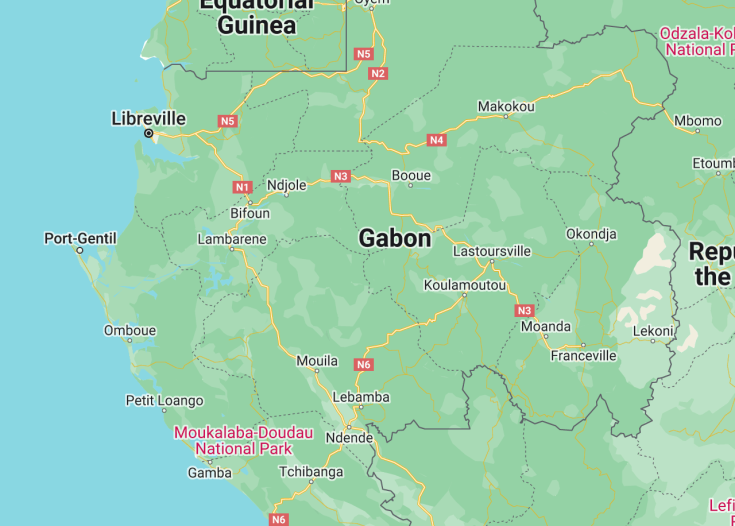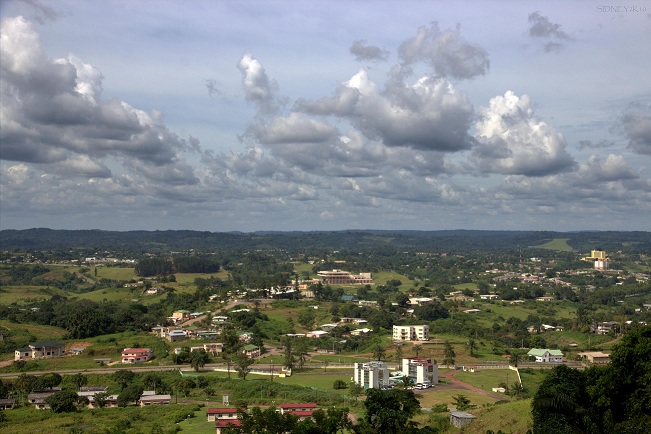Nestled on Africa’s west coast, Gabon is a sanctuary of biodiversity, offering travelers a glimpse into its lush rainforests, extensive national parks, and pristine coastal landscapes. Home to forest elephants, gorillas, and a myriad of bird species, Gabon provides a rich tapestry of wildlife and untouched beauty. From the vibrant rhythms of Libreville to the serene beaches of Mayumba, Gabon seamlessly blends urban charm with natural wonder. As an eco-tourism haven, this Central African nation beckons those keen to experience nature in its purest form.
When visiting Loango National Park, consider hiring a local guide to maximize wildlife sightings and navigate the terrains safely.
Immerse yourself in Gabon’s culture by partaking in local festivities and tasting traditional Gabonese cuisine.
Top destinations in Gabon
Gabon: A Tropical Paradise in Central Africa
| Capital | Libreville |
| Time in Gabon | GMT+1 |
| Language spoken | French |
| Population | 2,253,421 (World Bank) |
| Religion | Christianity (66.8%) Islam (9%) Indigenous religions (10.6%) |
| Currency | Central African CFA franc (XAF) |
| Airports | Libreville International Airport Port-Gentil International Airport |
In the heart of Central Africa lies Gabon, a gem of biodiversity and rich cultural tapestry. Known for its vast tracts of pristine rainforests, Gabon boasts landscapes untouched by time. The nation’s history is interwoven with the tales of indigenous tribes such as the Fang and the Punu, whose traditions continue to shape its cultural fabric. From ancient rituals to the melodic rhythms of Gabonese music, the nation is a confluence of old-world charm and modern vibrancy.
Historically a French colony, Gabon gained independence in 1960, and its French influence is still evident in its architecture, cuisine, and language. Over the decades, Gabon has strategically positioned itself as a bastion of conservation, with over 10% of its land designated as national parks. These protected areas safeguard not only rare and endangered species but also serve as a testament to Gabon’s commitment to preserving its natural heritage for future generations.
Tourists to Gabon are in for an eclectic experience. From the roaring Loango coastline, where whales and surfing hippos can be spotted, to the dense forests of Lopé National Park, teeming with elephants and gorillas, the nation offers unparalleled wildlife encounters. Additionally, the cultural festivals, vibrant markets, and the warmth of the Gabonese people make every visit memorable.
Where is Gabon located?
Gabon is located in Central Africa, bordered by Equatorial Guinea, Cameroon to the north, the Republic of the Congo to the east and south, and the Atlantic Ocean to the west.
What is Gabon famous for?
Gabon is renowned for its incredible biodiversity, pristine national parks, vibrant cultural festivals, and as a sanctuary for endangered species like forest elephants and western lowland gorillas.
History
Prehistoric to Early Tribal Era
Archaeological findings reveal that Gabon has been inhabited for thousands of years. Ancient relics and rock engravings attest to the existence of early civilizations and nomadic tribes who relied on hunting, fishing, and gathering. The major ethnic group, the Bantu, migrated into the region over time, establishing distinct tribal territories and cultures.
15th Century: European Exploration
Portuguese explorers, led by Fernão Vaz, were among the first Europeans to arrive in Gabon in the late 15th century. The estuary of the Gabon River, which they named ‘Gabão’, became a significant point for slave trade, and soon after, other European powers, including the Dutch, British, and French, became involved in the region.
19th Century: French Colonization
In the 19th century, European interest in Africa surged, leading to the so-called “Scramble for Africa.” The French established a protectorate over Gabon in the latter half of the century, integrating it into French Equatorial Africa by the close of the 1800s. This period was marked by the establishment of infrastructures, Christian missions, and schools, but also by significant changes to traditional Gabonese societies and economies.
1960: Independence
As winds of decolonization blew across Africa, Gabon too sought its sovereignty. On August 17, 1960, Gabon officially became an independent nation, breaking away from French Equatorial Africa. Léon M’ba became the country’s first Prime Minister and later its first President. Although the initial years were politically unstable with attempted coups, M’ba’s leadership ensured Gabon’s progression as a unified nation-state.
Late 20th Century: Economic Boom and Stability
Thanks to its vast natural resources, particularly oil, Gabon experienced an economic boom during the 1970s and 1980s. Omar Bongo, who succeeded M’ba, became one of Africa’s longest-serving leaders, ruling from 1967 to 2009. His tenure, though criticized for certain autocratic tendencies, brought about political stability, economic development, and the forging of a distinct national identity.
21st Century: Contemporary Gabon
Ali Bongo Ondimba, Omar Bongo’s son, assumed the presidency in 2009 and has since initiated reforms aimed at diversifying the economy, promoting sustainable practices, and reducing dependence on oil. The nation has also made significant strides in wildlife conservation, turning a considerable portion of its land into national parks. Contemporary Gabon faces the challenges and opportunities of the 21st century, balancing development with ecological preservation and striving for greater democratic participation.
Visit Gabon
What to see and do in Gabon
Gabon offers a range of attractions and activities for visitors to enjoy. Here are some things to see and do in Gabon:
- Explore the lush rainforests and national parks, such as Loango National Park and Lopé National Park, to discover diverse wildlife and beautiful landscapes.
- Visit the coastal city of Libreville, the capital of Gabon, and explore its vibrant markets, colonial architecture, and cultural sites.
- Experience Gabon’s rich cultural heritage by attending traditional ceremonies, music festivals, and art exhibitions.
- Relax on the pristine beaches along the Atlantic coast, such as Pointe-Denis Beach and Cap Esterias Beach.
- Go on a safari to observe gorillas, elephants, and other unique wildlife in their natural habitats.
Whether you are interested in nature, culture, or adventure, Gabon offers a diverse range of experiences for every traveler.
Events in Gabon
Gabon hosts various events throughout the year that showcase its vibrant culture and traditions. One of the most important events is the Gabon National Day, which is celebrated on August 17th to commemorate the country’s independence. The celebrations include parades, cultural performances, and fireworks.
Another significant event is the Kora Awards, an annual music awards ceremony that honors African musicians and promotes African music internationally. The Kora Awards attract musicians and music lovers from across the continent.
Additionally, Gabon also hosts traditional cultural festivals, such as the Mungongo Festival, where visitors can experience traditional dance, music, and food.
These events take place throughout the year, offering visitors a chance to immerse themselves in the vibrant culture and traditions of Gabon.
Best time to visit Gabon
The best time to visit Gabon is during the dry season, which runs from May to September. During this time, the weather is generally pleasant, with cooler temperatures and less rainfall. It’s an ideal time for outdoor activities, such as wildlife viewing and exploring the national parks.
However, it’s important to note that Gabon has a tropical climate, and even during the dry season, there may still be occasional showers. Visitors should come prepared with appropriate clothing and gear for both warm and wet conditions.
For those interested in witnessing Gabon’s cultural events, it’s recommended to plan a visit around August 17th to coincide with the Gabon National Day celebrations.
Overall, Gabon offers unique experiences throughout the year, but the dry season is generally considered the best time to visit.
Is Gabon worth visiting?
Gabon is definitely worth visiting for travelers seeking unique wildlife encounters and a chance to explore pristine natural landscapes. The country boasts diverse ecosystems, including rainforests, savannas, and coastal areas, which are home to a wide range of animal species, including gorillas, elephants, and hippos.
Furthermore, Gabon offers the opportunity to experience authentic African culture and traditions through vibrant festivals and cultural events. Visitors can immerse themselves in the local music, dance, and cuisine, gaining a deeper understanding of Gabon’s rich heritage. Additionally, the capital city, Libreville, provides a blend of modern amenities and colonial architecture.
However, it’s important to note that Gabon is still a developing country with some infrastructure challenges. Visitors should be prepared for potential inconveniences and take necessary precautions for safety and health. Additionally, it’s advised to research and respect local customs and traditions while traveling in Gabon.
Overall, Gabon offers a unique and off-the-beaten-path travel experience for those looking to explore the natural beauty and cultural richness of Central Africa.













